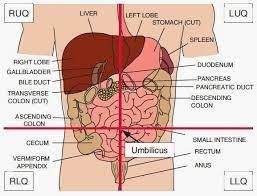The client asks the nursing student to crush her medications and put them in apple sauce. Even before the student researches the medications, he knows that the tablet he cannot deliver in this manner is:
loperamide 2 mg.
diltiazem SR 180 mg
acetaminophen 325 mg.
methyldopa 125 mg
The Correct Answer is B
Choice A rationale: Loperamide 2 mg is generally available in liquid form, so crushing is not typically necessary.
Choice B rationale: Diltiazem SR 180 mg (Sustained Release) should not be crushed, as it is formulated for extended release over time.
Choice C rationale: Acetaminophen 325 mg is usually available in liquid form, so crushing may not be necessary.
Choice D rationale: Methyldopa 125 mg is generally available in liquid form, so crushing may not be necessary.
Nursing Test Bank
Naxlex Comprehensive Predictor Exams
Related Questions
Correct Answer is A
Explanation
Choice A rationale: RLQ (Right Lower Quadrant) is the correct abbreviation for the location of the appendix, which is typically found in the right lower quadrant of the abdomen.
Choice B rationale: RUQ (Right Upper Quadrant) is not the location of the appendix.
Choice C rationale: LUQ (Left Upper Quadrant) is not the location of the appendix.
Choice D rationale: LLQ (Left Lower Quadrant) is not the location of the appendix.

Correct Answer is B
Explanation
Choice A rationale: Carbohydrates are important for energy but do not specifically promote wound healing.
Choice B rationale: Vitamin C is crucial for collagen synthesis and wound healing, so an increased intake is beneficial.
Choice C rationale: Calcium is important for bone health but does not have a direct role in promoting wound healing.
Choice D rationale: Vitamin E has antioxidant properties but is not the primary nutrient emphasized for wound healing.
Whether you are a student looking to ace your exams or a practicing nurse seeking to enhance your expertise , our nursing education contents will empower you with the confidence and competence to make a difference in the lives of patients and become a respected leader in the healthcare field.
Visit Naxlex, invest in your future and unlock endless possibilities with our unparalleled nursing education contents today
Report Wrong Answer on the Current Question
Do you disagree with the answer? If yes, what is your expected answer? Explain.
Kindly be descriptive with the issue you are facing.
